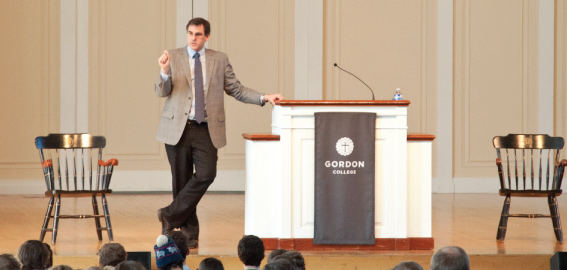STILLPOINT Archive: last updated 05/25/2012

By Hilary Sherratt ’12
Michael Ramsden, European Director of the Ravi Zacharius Trust, quickly abandoned his post behind the lectern and instead paced the Chapel stage, gesturing towards the gathered students and faculty, engaging them in a close reading of the first chapter of the gospel of Luke.
"Both Mary and Zechariah have a similar, scientific objection to the revelation they’ve been given," Ramsden noted. Yet the answers they get to their questions are different. Whereas Zechariah is struck dumb, Mary is given an explanation. The difference between the questions, Ramsden explained, is the difference between cynicism and confusion.
The Chapel was unusually still, except for the scribbling of pens on journal pages and spare notebook paper. It was an earnest receptiveness that permeated the entire Gordon campus during DEEP FAITH week, a time of spiritual reflection and renewal during the week of February 6, encompassing all three Chapel and Convocation services, with additional evening services Monday through Wednesday.
"There is a history of grassroots student desire for extended worship, a call to repentance and renewal—A Night with the King; Reveal and Respond; The Forgotten Third," said Greg Carmer, dean of chapel, referring to several past such movements at Christian colleges. "We wanted to try and find a space in the calendar to honor and address that desire."
This desire coincided with President Lindsay’s hope for a moment in his inaugural year to call the community to a renewed relationship with God. DEEP FAITH was born of these desires and hopes; and Michael Ramsden’s name rose quickly to the top of the list of possible speakers. "He could do both the thinking and the feeling or responsive parts of the week—both the heart and the mind—in a way that doesn’t build dichotomies between them," said Carmer.
And indeed, in his Friday convocation address, Ramsden offered reflections on the foundational reality of our being in Christ, rather than just our thinking, doing, and feeling.
The week’s addresses affirmed students’ freedom to ask questions of the faith, and to think critically and deeply about their commitments as Christians. Yet it also encouraged the Gordon community to ask thoughtful, responsible and deep questions. Ramsden suggested that Zechariah asks questions, not out of confusion or a desire to know the answer, but out of cynicism; as Dr. Carmer put it, out of "satisfied discontent."
Perhaps most importantly, the week renewed awareness of our common commitment of faith. As Carmer said, "Many students long for spiritual friendships—people we trust enough to talk honestly with, to pray with, share hope and joy and sorrow with. This week gives people a nudge towards connecting with others on these matters."
"It is the mundane rhythms that really change us," Dr. Carmer reminded me as I headed out of his office after talking with him. "When we go back to normal, we should ask: What is normal for us? These events can influence that norm." Indeed, as the campus returns to its usual rhythms, and students, faculty and staff return to their daily tasks, it is with a renewed awareness of the need to love God with our hearts and minds.
Hilary Sherratt is a recently-graduated senior Pike scholar majoring in Religion, Ethics and Politics. Named Collegian of the Year, she is from Rowley, Massachusetts. Hilary tweets at @hilarysherratt and blogs at sittinthereoncapitolhil.blogspot.com.
| Share this story: |   |